Unit 6 When was it invented单元复习课件 人教版九年级英语全一册
文档属性
| 名称 | Unit 6 When was it invented单元复习课件 人教版九年级英语全一册 | 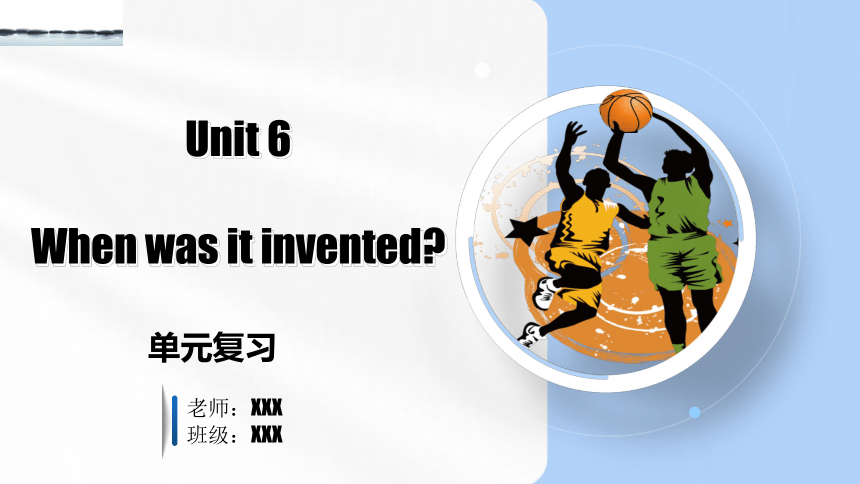 | |
| 格式 | pptx | ||
| 文件大小 | 21.5MB | ||
| 资源类型 | 教案 | ||
| 版本资源 | 人教新目标(Go for it)版 | ||
| 科目 | 英语 | ||
| 更新时间 | 2023-10-18 12:13:17 | ||
图片预览

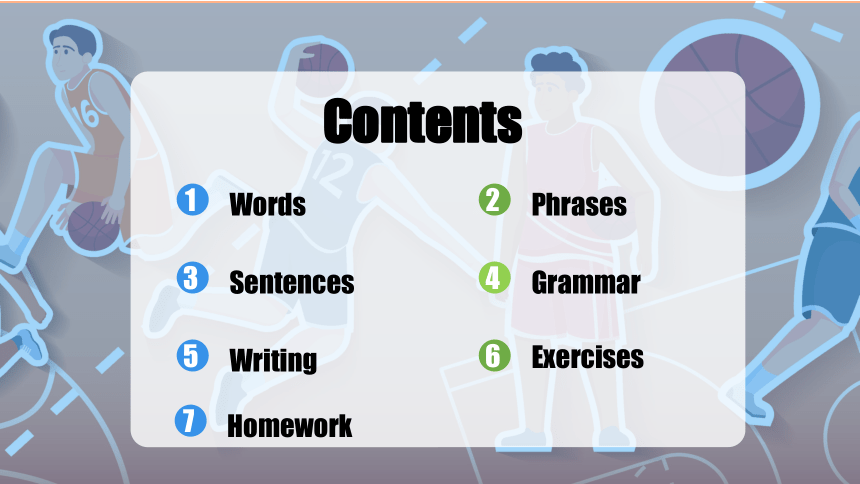
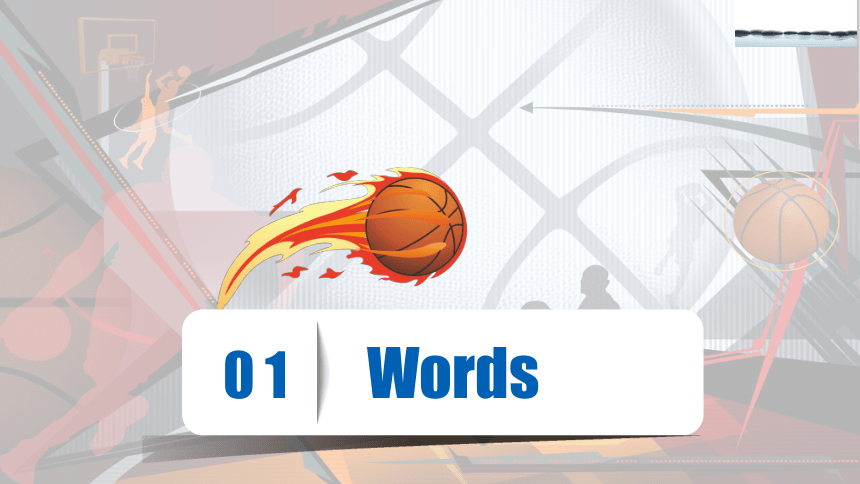
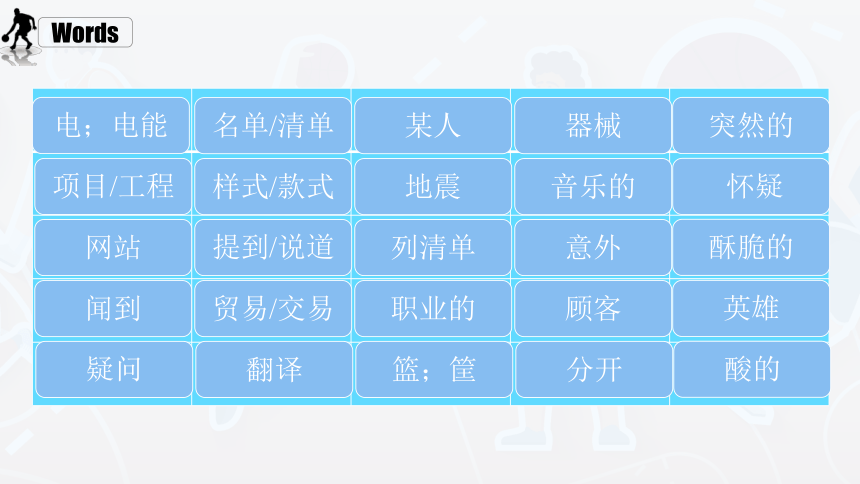
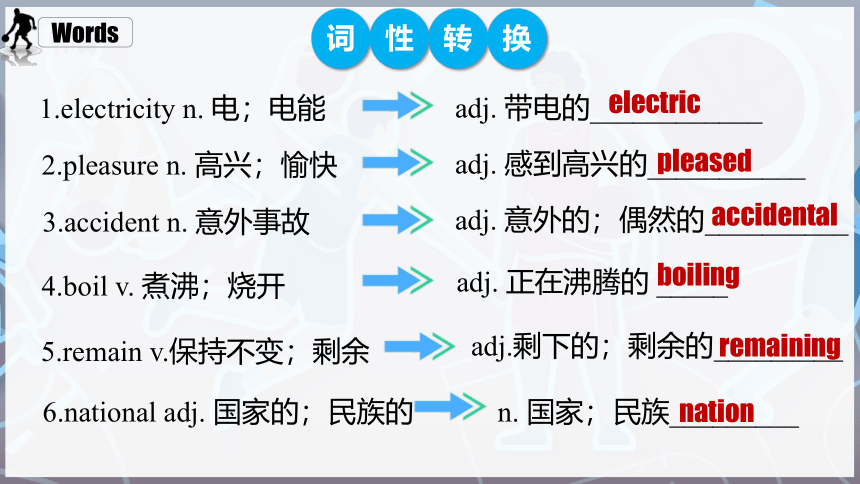
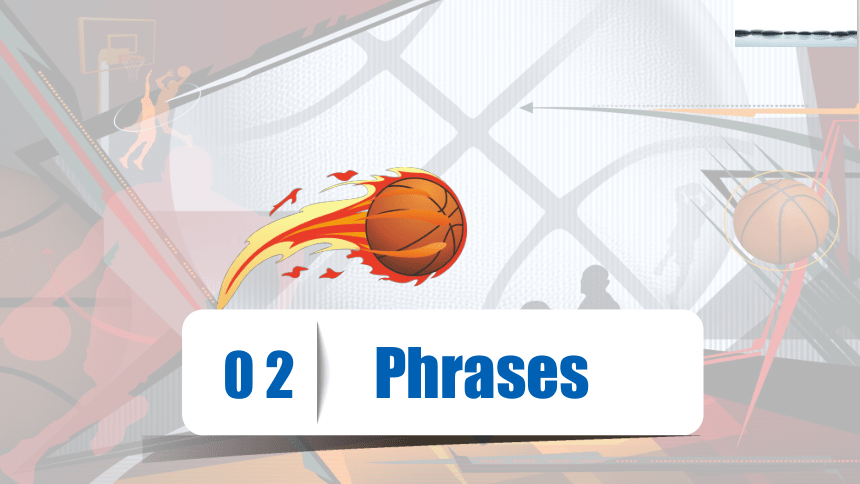
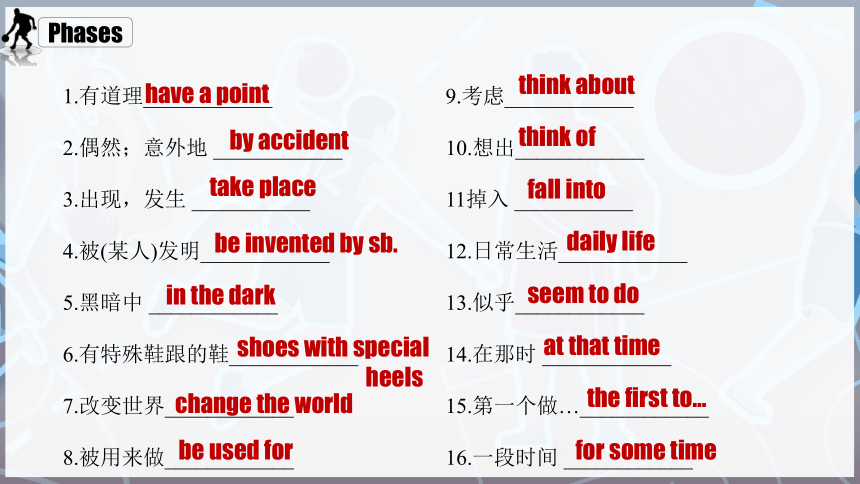
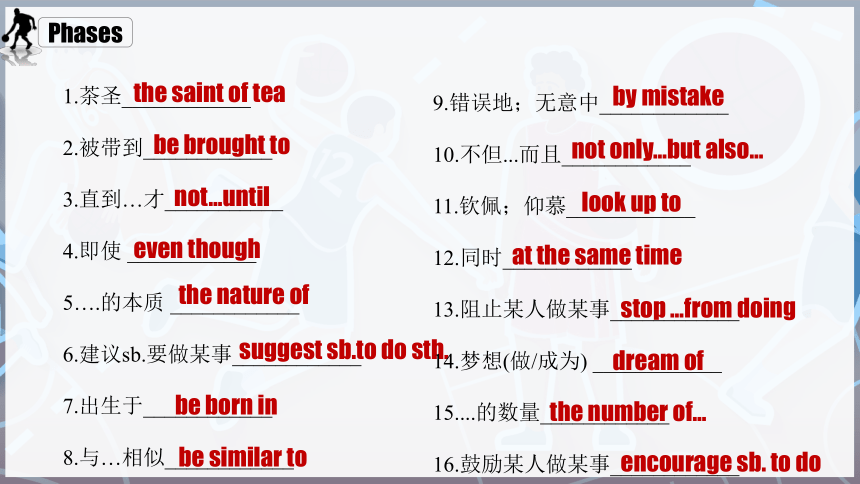
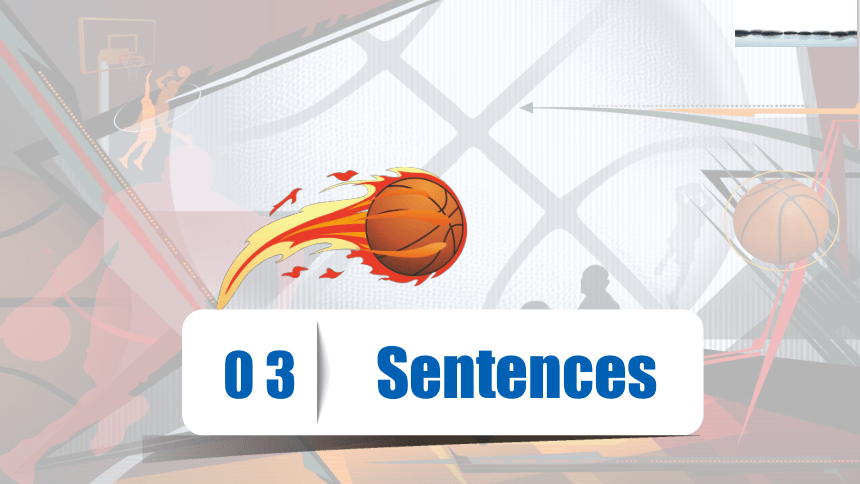
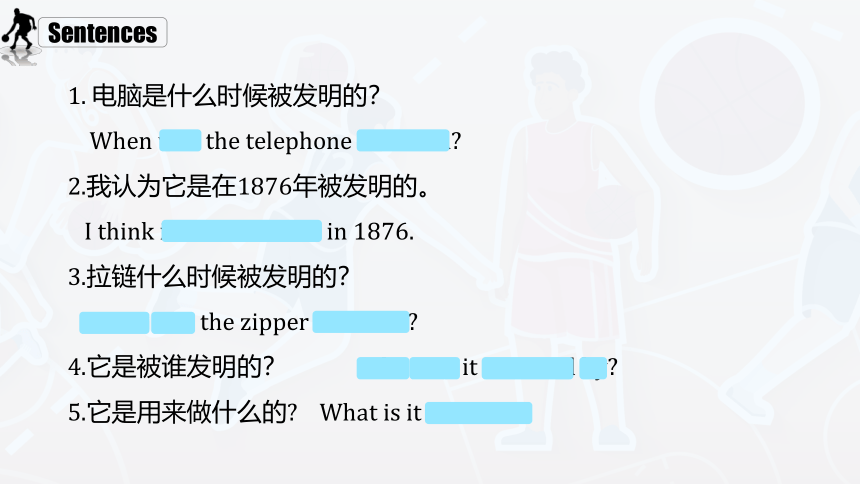
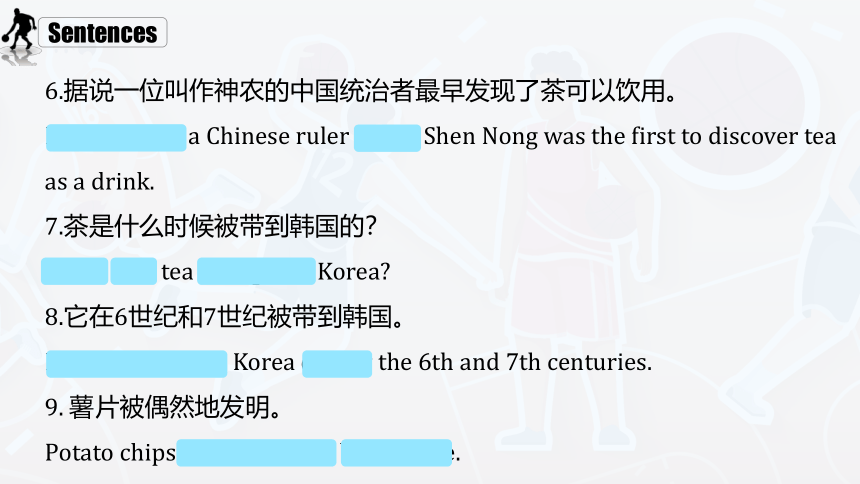
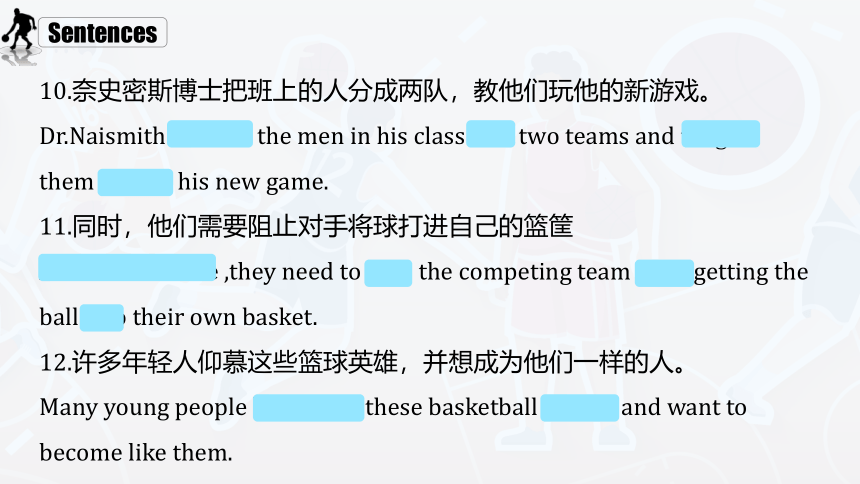
文档简介
(共68张PPT)
单元复习
老师:XXX
班级:XXX
Unit 6
When was it invented
Contents
Words
1
Phrases
2
Sentences
3
Grammar
4
Writing
5
Exercises
6
Homework
7
0 1 Words
electricity list somebody instrument sudden
project style earthquake musical doubt
website mention list accident crispy
smell trade professional customer hero
doubt translate basket divide sour
电;电能
名单/清单
某人
器械
项目/工程
样式/款式
地震
音乐的
网站
提到/说道
列清单
意外
闻到
贸易/交易
职业的
顾客
突然的
怀疑
酥脆的
英雄
疑问
翻译
篮;筐
分开
酸的
快速说出单词,
看谁说的又快又好!
Words
词
性
转
换
1.electricity n. 电;电能
adj. 带电的____________
electric
2.pleasure n. 高兴;愉快
adj. 感到高兴的___________
pleased
3.accident n. 意外事故
adj. 意外的;偶然的__________
accidental
5.remain v.保持不变;剩余
adj.剩下的;剩余的_________
remaining
6.national adj. 国家的;民族的
n. 国家;民族_________
nation
4.boil v. 煮沸;烧开
adj. 正在沸腾的 _____
boiling
Words
0 2 Phrases
1.有道理____________
2.偶然;意外地 ____________
3.出现,发生 ___________
4.被(某人)发明____________
5.黑暗中 ____________
6.有特殊鞋跟的鞋____________
7.改变世界____________
8.被用来做____________
have a point
by accident
take place
be invented by sb.
in the dark
shoes with special
heels
change the world
be used for
9.考虑____________
10.想出____________
11掉入 ___________
12.日常生活____________
13.似乎____________
14.在那时 ____________
15.第一个做…____________
16.一段时间 ____________
think about
think of
fall into
daily life
seem to do
at that time
the first to…
for some time
Phases
1.茶圣____________
2.被带到____________
3.直到…才___________
4.即使 ____________
5….的本质 ____________
6.建议sb.要做某事____________
7.出生于____________
8.与…相似____________
the saint of tea
be brought to
not…until
even though
the nature of
suggest sb.to do sth.
be born in
be similar to
9.错误地;无意中____________
10.不但...而且____________
11.钦佩;仰慕____________
12.同时____________
13.阻止某人做某事____________
14.梦想(做/成为) ____________
15....的数量____________
16.鼓励某人做某事____________
by mistake
not only…but also…
look up to
at the same time
encourage sb. to do
stop …from doing
dream of
the number of…
Phases
0 3 Sentences
1. 电脑是什么时候被发明的?
When was the telephone invented
2.我认为它是在1876年被发明的。
I think it was invented in 1876.
3.拉链什么时候被发明的?
When was the zipper invented
4.它是被谁发明的? Who was it invented by
5.它是用来做什么的 What is it used for
Sentences
6.据说一位叫作神农的中国统治者最早发现了茶可以饮用。
It is said that a Chinese ruler called Shen Nong was the first to discover tea as a drink.
7.茶是什么时候被带到韩国的?
When was tea brought to Korea
8.它在6世纪和7世纪被带到韩国。
It was brought to Korea during the 6th and 7th centuries.
9. 薯片被偶然地发明。
Potato chips were invented by mistake.
Sentences
10.奈史密斯博士把班上的人分成两队,教他们玩他的新游戏。
Dr.Naismith divided the men in his class into two teams and taught them to play his new game.
11.同时,他们需要阻止对手将球打进自己的篮筐
At the same time ,they need to stop the competing team from getting the ball into their own basket.
12.许多年轻人仰慕这些篮球英雄,并想成为他们一样的人。
Many young people look up to these basketball heroes and want to become like them.
Sentences
The sentences describing an invention
Who was it invented
How was it invented
When and wherewas it invented by
What is it used for
What are the influences of it
What is it made of
How does
it work
......
Sentences
0 4 Grammar
When was the zipper invented It was invented in 1893.
Who was it invented by It was invented by Whitcomb Judson.
When was tea brought to Korea It was brought to Korea during the 6th and 7th centuries.
What is the hot ice-cream scoop used for It’s used for serving really cold
ice-cream.
Active Voice: Alexander Graham Bell invented the telephone in 1876. Passive Voice: The telephone was invented (by Alexander Graham Bell) in 1876.
Focus on the two sentences.
Grammar
When was the zipper invented It was invented in 1893.
Who was it invented by It was invented by Whitcomb Judson.
When was tea brought to Korea It was brought to Korea during the 6th and 7th centuries.
What is the hot ice-cream scoop used for It’s used for serving really cold
ice-cream.
Active Voice: Alexander Graham Bell invented the telephone in 1876. Passive Voice: The telephone was invented (by Alexander Graham Bell) in 1876.
一般过去时态下的被动语态
Find out the passive voice.
Grammar
When was the zipper invented It was invented in 1893.
Who was it invented by It was invented by Whitcomb Judson.
When was tea brought to Korea It was brought to Korea during the 6th and 7th centuries.
What is the hot ice-cream scoop used for It’s used for serving really cold
ice-cream.
Active Voice: Alexander Graham Bell invented the telephone in 1876. Passive Voice: The telephone was invented (by Alexander Graham Bell) in 1876. Grammar Focus
一般过去时被动语态的句式
特殊疑问句形式
Observe these wh-questions.
Alexander Graham Bell invented the telephone in 1876.
主动变被动
1.主动语态变被动语态
The telephone was invented Alexander Graham Bell in 1876.
原宾语变被动的主语,
谓语动词由过去式变be+谓语动词的过去分词,
加之by引导
by
原主语变被动的宾语,
Grammar
These cakes are made by my mother.
These cakes ______made by my mother last night.
were
一般现在时的被动语态
一般过去时的被动语态的构成为:
_______________+及物动词的_____________。
was/were
过去分词
The classroom is cleaned (by us).
The classroom ____cleaned (by us) yesterday.
was
由be动词的时态决定
2.一般过去时被动语态的构成
Grammar
一般过去时被动语态的句式
句式 结构 例句
肯定句 主语+ was/ were +过去分词 +其他. He was chosen to work for the village.
否定句 主语+ wasn’t/ weren’t + 过去分词+其他. He wasn't chosen to work for the village.
一般疑问句及回答 Was/Were+主语+过去分词 +其他 肯定回答: Yes, 主语+ was/ were. 否定回答: No, 主语+ wasn’t/ weren’t. —Was he chosen to work for the village
—Yes, he was./No, he wasn't
特殊疑问句 特殊疑问词+一般疑问句 When was the bridge completed
Grammar
The baby was looked after by his mother .
①“不及物动词+介词/副词”构成的短语动词,变成被动时,
把它们作为________看待,介词或副词______(不可/可)拆开或漏掉。
整体
不可
含有短语的主动语态变被动语态
These posters were put up by our head teacher.
短语动词
拓展
Grammar
Mom bought me a new coat.
②当指“人”的间接宾语变为主语,指“物”的直接宾语保留不变;
如果把指“物”的直接宾语变为主语,则在指“人”的间接语前加_______.
to/for
含有双宾语的主动语态变被动语态
A new coat was bought for me. (直接接宾语作主语)
间接宾语
拓展
I was bought a new coat. (间接宾语作主语)
直接宾语
Grammar
A heavy man was seen to enter the house.
I saw a heavy man enter the house.
The teacher made Tom answer the questions in class.
Tom was made to answer the questions in class by the teacher.
③主动句中感官动词see / hear / watch / feel等和使役动词make / let / have等后跟省略to的动词不定式,变为被动语态时________(应/不应)加上不定式标志to。
应
感官动词和使役动词的被动语态
拓展
Grammar
不用被动语态的情况
拓展
②某些短语动词(take place, run out, come true, fall asleep…)没有被动语态。
This blouse belongs to Mary.
Great changes have taken place here.
③有些动词主动表被动。如(sell, wash, write,read,cost)等,主语是物。
1. This kind of cloth washes easily.
2. This book reads well.
3.The book cost Laura twenty dollars.
①系动词 (get/turn/become/seem/look/sound/smell/taste/feel+adj.)
没有被动语态。
1. These oranges taste nice.
2. This shirt feels much softer than that one.
特例
Grammar
This machine can be used for cutting grass.
be used for doing sth.表示“被用来做某事”。
与 be used to do sth. 同义,表示用途、目的。
考点
拓展
2
1.What is it / are they used for
考点
be used for
1
English is used as a foreign language in China.
Rubbers are used by the students to correct mistakes.
This computer is used to control all the machines.
辨析
2.be used by 意为“被……使用”
1.be used as
意为“被用作为…… ,被作为……使用”
language points
2.changing the style of the shoes
考点
style
style名词,意为“样式;款式”。
其常用短语 in style,意为“时髦的”,
反义短语为out of style,意为“过时的”。
This year's style in dresses is different from last year’s.
Her clothes are always in style.
This dress is out of style.
language points
I am pleased with the painting.
pleasure n. “高兴;愉快”
please v. 使满意
pleasant adj. 令人愉快的
pleased adj. 高兴的,满意的
pleasing adj. 令人满意的,令人高兴的
Wish you a pleasant journey!
3.With pleasure.
考点
pleasure
—Can you help me with this physics problem
—With pleasure.
—Thank you for helping find a hotel.
—My pleasure./It’s my pleasure.
language points
3.With pleasure.
考点
pleasure
辨析
1.pleasure 名词,“高兴;愉快”。
常见用法 My pleasure. / It’s a pleasure.
/ With pleasure.
2.pleased 形容词,“高兴的”,修饰人。
短语 be pleased to do sth.“乐于做某事”;
/ be pleased with “对……满意”。
3.pleasant 形容词,“令人愉快的”,
可作定语、表语,修饰物。
是别人对你感谢时的答语。
“这是我/一件很乐意去做的事情”
是别人请你帮忙时的答语。“非常乐意”。
language points
4.Think about how often it’s used in our daily lives.
考点
daily
1
用法
1.daily adj.“每日的;曰常的”(weekly, monthly, yearly)
in our daily lives /life 在日常生活中
2.daily adv. 每天;每日(every day)
3.daily n. 日报(every day)
China Daily .
The machine was inspected twice daily.
It’s not easy for us to make a true friend in our daily life.
language points
He is a poineer of computer animation(动画).
5.The pioneers of different inventions were listed there.
考点
pioneer
1
Please list the things that you need to buy.
Please list the things on the shopping list.
n.“先锋;先驱”。(常跟介词of/in)
考点
list
2
list
n.“名单;清单”
make a list of 列……清单
/on the list 在名单/清单上
vt.“列表;列清单”
language points
mention动词,意为“提到,说到”
6.it mentioned that the zipper was invented by
考点
mention
1
mention
①mention sb./sth. (to sb.) (向某人)提起某事
He didn’t mention his parents in the letter.
Nobody mentioned anything to me about it.
②mention doing sth.提到做某事
Whenever I mention having dinner together,
he says he’s too busy.
③其后可接that引导的宾语从句
He mentioned that the idea was from his father.
Don’t mention it. 不客气
language points
考点
It is said that
7.It is said that a Chinese ruler called Shen Nong...
It is said that…“据说……”。固定搭配的句型,
it是形式主语,真正的主语是后面的that从句。
It is said that Mary is very happy in London.
=They say that Mary is very happy in London.
考点
拓展类似句型
It is believed…(人们相信),
It is reported that …(据报道),
It is supposed that… (据猜测)
It is known that...众所周知......。
It is supposed that there is no life on the moon.
language points
考点
remain
8....and remained there for some time.
remain意为“逗留;留下”,相当于stay.
remain有“保持某种状态;继续存在;仍旧是”意思,
后面可以跟形容词、现在分词、介词短语等。
remain 作为名词,意为“剩余物;遗体;遗迹”, remains of the meal剩余饭菜,
remains of a temple 寺庙遗迹。
She remained sitting when they came in.
Whatever great progress you have made, you should remain modest.
This remains in my mind. = I keep this in my mind.
remain只作不及物动词,而keep 可作及物动词。
language points
考点
took place
9.The tea trade from China to Western countries took place in the 19th century.
take place 意为“发生;出现”, 一般用于______________(非偶然/偶然)事件的“发生”,指事件的发生一定有某种原因或事先安排;
而happen 一般用于____________(非偶然/偶然)事件。
The Olympic Games of 2008 took place in Beijing.
I happened to sit by her in the cinema.
非偶然
偶然
language points
考点
smell
10.It produced a nice smell so he tasted the brown water.
② 作连系动词, 表示“闻起来,发出......的气味”
后跟形容词作表语。
These flowers smell very sweet.
① 作名词,意为“气味”,常与of连用,表示“......的气味”。
There's a delicious smell coming from the kitchen.
The air was filled with the smell of flowers.
③ 作及物动词,表示“闻到,嗅到”,不用于进行时。
Can you smell something
smell
language points
考点
smell拓展
11.It produced a nice smell so he tasted the brown water.
feel,look, sound, smell, taste均可作连系动词,
后面接形容词作表语,说明主语所处的状态。
其意思分别为“感觉”,“看”,“听”,“闻”,“尝起来”。
I'm feeling terrible.
The soup tastes delicious.
The fish smells good.
The song Together for a Shared Future sounds beautiful.
language points
考点
doubt
12.the Chinese are without doubt the ones who best understand the nature of tea.
Without doubt, factory farming is bad news.
I had my doubts when she started, but she's getting really good.
doubt
② 作动词,意为“怀疑”,后常接名词、代词
或that /if/whether引导的从句作宾语。
①作名词,意为“疑惑;疑问”。
常用短语 without doubt毫无疑问;的确
They doubt the truth of it.(名词)
We don't doubt that you are right.(that从句)
I doubt if / whether he will come earlier this time. (if / whether从句)
language points
14.by mistake
考点
by mistake
介词短语,意为“无意中;错误地”,
相当于accidentally。
常用短语:mistake…for 把……误认为,
make a mistake 犯错
I missed the school bus by mistake this morning.
I took your pen by mistake.
They mistook me for their English teacher.
language points
The soup is a little salty for me.
形容词,意为“咸的;含盐的”,
是由名词salt(盐)加后缀-y构成的。
15. salty
考点
salty
考点
拓展
2
名词+后缀-y构成的形容词:
luck—lucky health—healthy wind—windy rain—rainy taste — tasty ice —icy
sun—sunny snow —snowy
language points
16.The customer was happy in the end.
考点
in the end
后来,最后,终于
相当于finally,
近义词组at last 。
He won in the end. / He won finally. /He won at last.
辨析
1.in the end 后来,最后,终于
He will win the prize in the end.
2.at the end of ... 在……末
At the end of this month we’ll have a meeting.
3.by the end of ... 到……末为止
By the end of last year we’ve made ten cars.
language points
17.George wanted to make the customer happy.
考点
make
1
Reading books makes us clever.
The boss makes the workers work ten hours a day.
“make the customer happy”
“make+宾语+宾语补足语”结构,
宾语补足语由形容词充当。
除形容词外,介词短语、名词、不带to的不定式、分词都可作宾语补足语。
language points
考点
divide
18.Dr.Naismith divided the men in his class into two teams.
divide 及物动词,意为"分开;分散",
指把整体分成若干部分。
divided ....into把…分开
其被动结构为 be divided into,意为"被分为…"。
At the end of the lecture, I’d like to divide all the students into small discussion groups.
language points
He divided the cake among the children.
考点
stop ...from ...
19.At the same time ,they need to stop the competing team
from getting the ball into their own basket.
阻止……做某事
stop sb.from doing sth.相当于prevent sb.from doing sth.,在主动语态中,两者中的from均可省略,但在被动语态中不可省略。
The water must be prevented from polluting by us.
language points
No one can stop us (from) carrying out the plan.
考点
popularity
1
20.Today, the popularity of basketball has risen around
the world, with many young people dreaming of becoming famous players.
名词,意为“受欢迎;普及;流行”,
其形容词形式popular意为“受欢迎的”。
language points
popularity
c
popular
c
派生法
wood-----wooden
equip-----equipment
考点
popularity
1
20.Today, the popularity of basketball has risen around
the world, with many young people dreaming of becoming famous players.
单词记忆除派生法,还有合成法,转换法。
language points
basketball
c
合成法
every+where
=everywhere
air n. 空气 v.通风
dream
n.v.
c
转换法
考点
risen
2
20.Today, the popularity of basketball has risen around
the world, with many young people dreaming of becoming famous players.
rise不及物动词,
意为“增加;提高攀升;升起; 站起来”。
其过去式、过去分词分别为 rose 和 risen。
language points
The sun rises in the east and sets west.
辨析
2.raise 意为“举起,提高,抚养”,
是及物动词。
1.rise 意为“升起,上升”,
是不及物动词,不能用于被动语态。
考点
with
3
20.Today, the popularity of basketball has risen around
the world, with many young people dreaming of becoming famous players.
“with +宾语+现在分词”构成的复合结构
在句中作伴随状语。
with表伴随的用法还有:
(with十宾语+介词短语)/(with+宾语+ 副词)
language points
With winter coming on, it’s time to buy warm clothes.
He came in with a smile on his face.
Anderson left his house with the lights on.
考点
dreaming of
4
20.Today, the popularity of basketball has risen around
the world, with many young people dreaming of becoming famous players.
① dream作及物动词时,
后接名词、代词或that从句作宾语。
② dream作可数名词,意为“梦;梦想”。
③ dream of : 梦想;想象= dream about
language points
He dreamed a sweet dream.
His dream will come true next year.
They dream of going to college.
考点
look up to
1
21.Many young people look up to these basketball heroes
and want to become like them.
look up to 钦佩;仰慕
look up to还可意为“抬头看;仰望”。
反义短语是look down on 看不起,鄙视。
language points
I looked up to Thomas Edison when I was a child.
He looked up to the sky and seemed to be thinking.
考点
look 常用词组
1
look for 寻找 look down 向下看
look after 照看;照顾 look around 环顾四周
look up 向上看;查阅(词典) look forward to 盼望
考点
hero
2
22.Many young people look up to these basketball heroes
and want to become like them.
hero可数名词,意为“英雄;男主角”,
其复数形式为在词尾加-es。
language points
In those stories there are many brave heroes.
考点
拓展
2
其他常见以o结尾家-es变复数的名词
Negro —Negroes (黑人) potato — potatoes (土豆) tomato —tomatoes (西红柿)
考点
not only...but also
23.Basketball has not only become a popular sport to play,
but it has also become a popular sport to watch.
不但……而且……
not only ... but also... 连接两个对称的并列成分,连接两个主语时谓语动词要采用就近原则。
language points
Not only Mr. Lin but also his son loves the movie.
考点
拓展
常见的就近原则的结构有:
(1) neither...nor... 既不……也不…… (两者都不)
(2) either...or...不是……就是…… (两者中的一个)
Neither you nor I like him.
Either you or Lily is a student.
考点
encourage
1
24.These stars encourage young people to work hard to
achieve their dreams.
encourage动词,意为“鼓励;激励;支 持”。
常用结构:
encourage sb. to do sth.“鼓励某人做某事”。
language points
Parents should encourage children to do things by themselves.
The teacher often encourages us to study hard.
考点
achieve
2
24.These stars encourage young people to work hard to
achieve their dreams.
language points
I believe I can achieve my dream.
I hope my dream will come true.
辨析
2.come true “实现”,主语通常是梦想等。
1.achieve “实现;完成”,主语通常是人。
0 5 Writing
本单元的话题是“Invention (发明)”。
写作内容通常要求根据图表或文字提示介绍发明物的相关情况(历史、用途、特点等),或者针对生活中的实际情况,提出自己的发明建议。
写作时,要求学生能够运用本单元的语言知识,尤其是一般过去时的被动语态来组织语言。
Writing
Writing
How to introduce an invention
开篇点题
详尽描述
表达观点
How to
introduce an invention
Beginning
Ending
Body
What
Show opinion
What,How
Writing
实
战
演
练
你校的英语学习校刊就The Most Useful Invention in My Life这一话题正在征文。请你根据以下提示,用英语写一篇短文,发到你校的英语学习校刊编辑部。
写作要点:1. 一个发明名称;
2. 此发明的好处(至少三点);
3. 你对此发明的感想。
写作要求:
1. 包含所有要点,可适当增加细节,使结构完整、行文流畅;
2. 使用正确和较丰富的词汇和语法结构,书写规范;
3. 文中不得透露个人信息,否则不予评分;
4. 词数80左右。
Writing
Writing
I think the most useful invention in my life is the Internet.
With the Internet, I can do many things. For example, I can do some shopping without leaving my home. I bought a pair of shoes and some books online last week. I can enjoy music on the Internet and learn some popular songs. When I finish my homework, I can play games on the Internet. I can keep in touch with my pen pal in Japan by using e-mail. It’s faster than writing letters, and it’s cheaper than making a phone call.
The Internet makes my life more colorful and easier.
The Most Useful Invention in My Life
【详解】
[总体分析]
①题材:本文是一篇材料作文;
②时态:时态为“一般现在时”;
③提示:注意结合提示内容进行写作,适当添加细节,并突出写作重点。
[写作步骤]
第一步,点出一个有用的发明;
第二步,介绍这一发明的三点或更多好处;
第三步,表达自己对这一发明的看法。
[亮点词汇]
①For example例如
②do some shopping购物
③keep in touch with和……保持联系
④make a phone call打电话
[高分句型]
①When I finish my homework, I can play games on the Internet.(when引导的时间状语从句)
②It’s faster than writing letters, and it’s cheaper than making a phone call.(比较级的应用)
Writing
0 6 Exercises
1.大部分学生不但喜欢流行歌曲,而且乐于看电视。
Most students__________like pop songs,___________enjoy watching TV.
2.据报道约200人在芦山地震中丧生。
It _____________that about 200 people had lost their lives in Lushan earthquake.
3.The astronauts on the__________(national) Space Station can even connect to the Internet.
4.They refused to t__________, even when Jack offered attractive prices.
5.The photos on the wall are from one of the old__________(开拓者).
一、完成句子(词数不限)。
not only
but also
was reported
Exercises
National
(t)rade
pioneers
1.【详解】根据提示可知需要翻译“不但……而且……”,not only...but also...“不但……而且……”。故填not only;but also。
2.【详解】根据中英文句子可知空处填“据报道”。it was/is reported that...“据报道”;根据“about 200 people had lost their lives in Lushan earthquake”可知,句子要用一般过去时,故填was reported。
3.【详解】句意:国家空间站上的宇航员甚至可以连接到互联网。根据“Space Station”可知此处应用专有名词National Space Station表示“国家空间站”。其中,形容词national修饰名词station。故填National。
4.【详解】句意:即使杰克出价诱人,他们也拒绝交易。根据首字母提示和“even when Jack offered attractive prices”可知,他们拒绝交易,trade“交易”符合句意,此处to是动词不定式符号,故填(t)rade。
5.【详解】句意:墙上的照片是其中一位老开拓者拍的。开拓者:pioneer,是可数名词,“one of...”后接可数名词的复数形式,pioneer后直接加s即可,故填pioneers。
一、完成句子
Exercises
Is your schoolbag too heavy The e-schoolbag will help you. It is said that e-schoolbags are going to be brought into 1 in Chinese middle schools soon.
Heavy schoolbags have been a serious 2 for a long time, but the e-schoolbags will 3 . A schoolbag is 4 lighter than a usual schoolbag. Perhaps the e-schoolbag should be 5 an e-textbook. It is a small computer for students. It is as 6 as a usual book, 7 it can still have all the things for study, such as textbooks, exercise-books and so on. They can made 8 chips
(芯片)like stamps. The students can read the text page by page on the screen, take notes, or even send e-mails to their teachers. They only need to 9 the right chip into the e-schoolbags.
Some people say 10 e-textbooks can be easily broken, while others say they are good students’ eyes. Perhaps only time will tell who is right.
二、完形填空.
Exercises
1.A.use B.useful C.used
2.A.idea B.problem C.question
3.A.work it out B.work out it C.work out
4.A.very B.much C.too much
5.A.call B.calls C.called
6.A.small B.smaller C.smallest
7.A.and B.but C.or
8.A.into B.from C.up
9.A.bring B.take C.put
10.A.if B.what C.that
二、完形填空.
Exercises
参考答案:
1.A 2.B 3.A 4.B 5.C 6.A 7.B 8.A 9.C 10.C
【导语】本文主要讲解了未来学生的普通的书包将会被轻轻的电子书包所代替,并且阐述了电子书包的一些特征。
1.句意:据说,电子书包将很快在中国的中学中投入使用。
use用处;useful有用的;used二手的。介词into后接名词use。故选A。
2.句意:沉重的书包长期以来一直是一个严重的问题,但电子书包将解决这个问题。
idea想法;problem问题(坏问题);question问题(一般性的问题)。根据“Heavy schoolbags have been a serious”可知,这是一个严重的问题。故选B。
3.句意:沉重的书包长期以来一直是一个严重的问题,但电子书包将解决这个问题。
work it out解决它;work out it错误搭配,it放在中间;work out解决。此空指解决这个问题,用it代替problem,work out是动副短语,代词放在中间。故选A。
4.句意:一个书包比一般的书包轻得多。
very很; much太;too much太多。此空修饰比较急lighter,应填much。故选B。
5.句意:也许电子书包应该被称为电子教科书。
call动词原形;calls动词三单;called动词过去式或过去分词。根据“should be”可知,此空应填过去分词与其构成含有情态动词的被动语态。故选C。
6.句意:它和普通的书一样小,但它仍然可以有所有的学习的东西,如课本,练习本等。
small小的,形容词原级;smaller更小的,形容词比较级;smallest最小的,形容词最高级。故选A。as…as中间接形容词原级。故选A。
7.句意:它和普通的书一样小,但它仍然可以有所有的学习的东西,如课本,练习本等。
and和;but但是;or或者。“it can still have all the things for study”与前文是转折关系。故选B。
8.句意:它们可以像邮票一样制成薄片。
into到……里面;from从;up向上。根据“They can made… chips”可知,此处指被制成薄片,be made into“被制成”。故选A。
9.句意:他们只需要把正确的芯片放进电子书包。
bring带来;take带走;put放。根据“the right chip into the e-schoolbags”可知,把正确的芯片放进电子书包。故选C。
10.句意:一些人说电子教科书很容易坏,而另一些人说它们是好学生的眼睛。
if是否;what什么;that引导从句无实际意义。分析句子结构可知,空格后是一个宾语从句,且从句结构完成,用that引导宾语从句,故选C。
二、完形填空
Exercises
0 7 Homework
Remember the words, expressions and sentences in this unit.
Homework
老师:XXX
班级:XXX
See you!
单元复习
老师:XXX
班级:XXX
Unit 6
When was it invented
Contents
Words
1
Phrases
2
Sentences
3
Grammar
4
Writing
5
Exercises
6
Homework
7
0 1 Words
electricity list somebody instrument sudden
project style earthquake musical doubt
website mention list accident crispy
smell trade professional customer hero
doubt translate basket divide sour
电;电能
名单/清单
某人
器械
项目/工程
样式/款式
地震
音乐的
网站
提到/说道
列清单
意外
闻到
贸易/交易
职业的
顾客
突然的
怀疑
酥脆的
英雄
疑问
翻译
篮;筐
分开
酸的
快速说出单词,
看谁说的又快又好!
Words
词
性
转
换
1.electricity n. 电;电能
adj. 带电的____________
electric
2.pleasure n. 高兴;愉快
adj. 感到高兴的___________
pleased
3.accident n. 意外事故
adj. 意外的;偶然的__________
accidental
5.remain v.保持不变;剩余
adj.剩下的;剩余的_________
remaining
6.national adj. 国家的;民族的
n. 国家;民族_________
nation
4.boil v. 煮沸;烧开
adj. 正在沸腾的 _____
boiling
Words
0 2 Phrases
1.有道理____________
2.偶然;意外地 ____________
3.出现,发生 ___________
4.被(某人)发明____________
5.黑暗中 ____________
6.有特殊鞋跟的鞋____________
7.改变世界____________
8.被用来做____________
have a point
by accident
take place
be invented by sb.
in the dark
shoes with special
heels
change the world
be used for
9.考虑____________
10.想出____________
11掉入 ___________
12.日常生活____________
13.似乎____________
14.在那时 ____________
15.第一个做…____________
16.一段时间 ____________
think about
think of
fall into
daily life
seem to do
at that time
the first to…
for some time
Phases
1.茶圣____________
2.被带到____________
3.直到…才___________
4.即使 ____________
5….的本质 ____________
6.建议sb.要做某事____________
7.出生于____________
8.与…相似____________
the saint of tea
be brought to
not…until
even though
the nature of
suggest sb.to do sth.
be born in
be similar to
9.错误地;无意中____________
10.不但...而且____________
11.钦佩;仰慕____________
12.同时____________
13.阻止某人做某事____________
14.梦想(做/成为) ____________
15....的数量____________
16.鼓励某人做某事____________
by mistake
not only…but also…
look up to
at the same time
encourage sb. to do
stop …from doing
dream of
the number of…
Phases
0 3 Sentences
1. 电脑是什么时候被发明的?
When was the telephone invented
2.我认为它是在1876年被发明的。
I think it was invented in 1876.
3.拉链什么时候被发明的?
When was the zipper invented
4.它是被谁发明的? Who was it invented by
5.它是用来做什么的 What is it used for
Sentences
6.据说一位叫作神农的中国统治者最早发现了茶可以饮用。
It is said that a Chinese ruler called Shen Nong was the first to discover tea as a drink.
7.茶是什么时候被带到韩国的?
When was tea brought to Korea
8.它在6世纪和7世纪被带到韩国。
It was brought to Korea during the 6th and 7th centuries.
9. 薯片被偶然地发明。
Potato chips were invented by mistake.
Sentences
10.奈史密斯博士把班上的人分成两队,教他们玩他的新游戏。
Dr.Naismith divided the men in his class into two teams and taught them to play his new game.
11.同时,他们需要阻止对手将球打进自己的篮筐
At the same time ,they need to stop the competing team from getting the ball into their own basket.
12.许多年轻人仰慕这些篮球英雄,并想成为他们一样的人。
Many young people look up to these basketball heroes and want to become like them.
Sentences
The sentences describing an invention
Who was it invented
How was it invented
When and wherewas it invented by
What is it used for
What are the influences of it
What is it made of
How does
it work
......
Sentences
0 4 Grammar
When was the zipper invented It was invented in 1893.
Who was it invented by It was invented by Whitcomb Judson.
When was tea brought to Korea It was brought to Korea during the 6th and 7th centuries.
What is the hot ice-cream scoop used for It’s used for serving really cold
ice-cream.
Active Voice: Alexander Graham Bell invented the telephone in 1876. Passive Voice: The telephone was invented (by Alexander Graham Bell) in 1876.
Focus on the two sentences.
Grammar
When was the zipper invented It was invented in 1893.
Who was it invented by It was invented by Whitcomb Judson.
When was tea brought to Korea It was brought to Korea during the 6th and 7th centuries.
What is the hot ice-cream scoop used for It’s used for serving really cold
ice-cream.
Active Voice: Alexander Graham Bell invented the telephone in 1876. Passive Voice: The telephone was invented (by Alexander Graham Bell) in 1876.
一般过去时态下的被动语态
Find out the passive voice.
Grammar
When was the zipper invented It was invented in 1893.
Who was it invented by It was invented by Whitcomb Judson.
When was tea brought to Korea It was brought to Korea during the 6th and 7th centuries.
What is the hot ice-cream scoop used for It’s used for serving really cold
ice-cream.
Active Voice: Alexander Graham Bell invented the telephone in 1876. Passive Voice: The telephone was invented (by Alexander Graham Bell) in 1876. Grammar Focus
一般过去时被动语态的句式
特殊疑问句形式
Observe these wh-questions.
Alexander Graham Bell invented the telephone in 1876.
主动变被动
1.主动语态变被动语态
The telephone was invented Alexander Graham Bell in 1876.
原宾语变被动的主语,
谓语动词由过去式变be+谓语动词的过去分词,
加之by引导
by
原主语变被动的宾语,
Grammar
These cakes are made by my mother.
These cakes ______made by my mother last night.
were
一般现在时的被动语态
一般过去时的被动语态的构成为:
_______________+及物动词的_____________。
was/were
过去分词
The classroom is cleaned (by us).
The classroom ____cleaned (by us) yesterday.
was
由be动词的时态决定
2.一般过去时被动语态的构成
Grammar
一般过去时被动语态的句式
句式 结构 例句
肯定句 主语+ was/ were +过去分词 +其他. He was chosen to work for the village.
否定句 主语+ wasn’t/ weren’t + 过去分词+其他. He wasn't chosen to work for the village.
一般疑问句及回答 Was/Were+主语+过去分词 +其他 肯定回答: Yes, 主语+ was/ were. 否定回答: No, 主语+ wasn’t/ weren’t. —Was he chosen to work for the village
—Yes, he was./No, he wasn't
特殊疑问句 特殊疑问词+一般疑问句 When was the bridge completed
Grammar
The baby was looked after by his mother .
①“不及物动词+介词/副词”构成的短语动词,变成被动时,
把它们作为________看待,介词或副词______(不可/可)拆开或漏掉。
整体
不可
含有短语的主动语态变被动语态
These posters were put up by our head teacher.
短语动词
拓展
Grammar
Mom bought me a new coat.
②当指“人”的间接宾语变为主语,指“物”的直接宾语保留不变;
如果把指“物”的直接宾语变为主语,则在指“人”的间接语前加_______.
to/for
含有双宾语的主动语态变被动语态
A new coat was bought for me. (直接接宾语作主语)
间接宾语
拓展
I was bought a new coat. (间接宾语作主语)
直接宾语
Grammar
A heavy man was seen to enter the house.
I saw a heavy man enter the house.
The teacher made Tom answer the questions in class.
Tom was made to answer the questions in class by the teacher.
③主动句中感官动词see / hear / watch / feel等和使役动词make / let / have等后跟省略to的动词不定式,变为被动语态时________(应/不应)加上不定式标志to。
应
感官动词和使役动词的被动语态
拓展
Grammar
不用被动语态的情况
拓展
②某些短语动词(take place, run out, come true, fall asleep…)没有被动语态。
This blouse belongs to Mary.
Great changes have taken place here.
③有些动词主动表被动。如(sell, wash, write,read,cost)等,主语是物。
1. This kind of cloth washes easily.
2. This book reads well.
3.The book cost Laura twenty dollars.
①系动词 (get/turn/become/seem/look/sound/smell/taste/feel+adj.)
没有被动语态。
1. These oranges taste nice.
2. This shirt feels much softer than that one.
特例
Grammar
This machine can be used for cutting grass.
be used for doing sth.表示“被用来做某事”。
与 be used to do sth. 同义,表示用途、目的。
考点
拓展
2
1.What is it / are they used for
考点
be used for
1
English is used as a foreign language in China.
Rubbers are used by the students to correct mistakes.
This computer is used to control all the machines.
辨析
2.be used by 意为“被……使用”
1.be used as
意为“被用作为…… ,被作为……使用”
language points
2.changing the style of the shoes
考点
style
style名词,意为“样式;款式”。
其常用短语 in style,意为“时髦的”,
反义短语为out of style,意为“过时的”。
This year's style in dresses is different from last year’s.
Her clothes are always in style.
This dress is out of style.
language points
I am pleased with the painting.
pleasure n. “高兴;愉快”
please v. 使满意
pleasant adj. 令人愉快的
pleased adj. 高兴的,满意的
pleasing adj. 令人满意的,令人高兴的
Wish you a pleasant journey!
3.With pleasure.
考点
pleasure
—Can you help me with this physics problem
—With pleasure.
—Thank you for helping find a hotel.
—My pleasure./It’s my pleasure.
language points
3.With pleasure.
考点
pleasure
辨析
1.pleasure 名词,“高兴;愉快”。
常见用法 My pleasure. / It’s a pleasure.
/ With pleasure.
2.pleased 形容词,“高兴的”,修饰人。
短语 be pleased to do sth.“乐于做某事”;
/ be pleased with “对……满意”。
3.pleasant 形容词,“令人愉快的”,
可作定语、表语,修饰物。
是别人对你感谢时的答语。
“这是我/一件很乐意去做的事情”
是别人请你帮忙时的答语。“非常乐意”。
language points
4.Think about how often it’s used in our daily lives.
考点
daily
1
用法
1.daily adj.“每日的;曰常的”(weekly, monthly, yearly)
in our daily lives /life 在日常生活中
2.daily adv. 每天;每日(every day)
3.daily n. 日报(every day)
China Daily .
The machine was inspected twice daily.
It’s not easy for us to make a true friend in our daily life.
language points
He is a poineer of computer animation(动画).
5.The pioneers of different inventions were listed there.
考点
pioneer
1
Please list the things that you need to buy.
Please list the things on the shopping list.
n.“先锋;先驱”。(常跟介词of/in)
考点
list
2
list
n.“名单;清单”
make a list of 列……清单
/on the list 在名单/清单上
vt.“列表;列清单”
language points
mention动词,意为“提到,说到”
6.it mentioned that the zipper was invented by
考点
mention
1
mention
①mention sb./sth. (to sb.) (向某人)提起某事
He didn’t mention his parents in the letter.
Nobody mentioned anything to me about it.
②mention doing sth.提到做某事
Whenever I mention having dinner together,
he says he’s too busy.
③其后可接that引导的宾语从句
He mentioned that the idea was from his father.
Don’t mention it. 不客气
language points
考点
It is said that
7.It is said that a Chinese ruler called Shen Nong...
It is said that…“据说……”。固定搭配的句型,
it是形式主语,真正的主语是后面的that从句。
It is said that Mary is very happy in London.
=They say that Mary is very happy in London.
考点
拓展类似句型
It is believed…(人们相信),
It is reported that …(据报道),
It is supposed that… (据猜测)
It is known that...众所周知......。
It is supposed that there is no life on the moon.
language points
考点
remain
8....and remained there for some time.
remain意为“逗留;留下”,相当于stay.
remain有“保持某种状态;继续存在;仍旧是”意思,
后面可以跟形容词、现在分词、介词短语等。
remain 作为名词,意为“剩余物;遗体;遗迹”, remains of the meal剩余饭菜,
remains of a temple 寺庙遗迹。
She remained sitting when they came in.
Whatever great progress you have made, you should remain modest.
This remains in my mind. = I keep this in my mind.
remain只作不及物动词,而keep 可作及物动词。
language points
考点
took place
9.The tea trade from China to Western countries took place in the 19th century.
take place 意为“发生;出现”, 一般用于______________(非偶然/偶然)事件的“发生”,指事件的发生一定有某种原因或事先安排;
而happen 一般用于____________(非偶然/偶然)事件。
The Olympic Games of 2008 took place in Beijing.
I happened to sit by her in the cinema.
非偶然
偶然
language points
考点
smell
10.It produced a nice smell so he tasted the brown water.
② 作连系动词, 表示“闻起来,发出......的气味”
后跟形容词作表语。
These flowers smell very sweet.
① 作名词,意为“气味”,常与of连用,表示“......的气味”。
There's a delicious smell coming from the kitchen.
The air was filled with the smell of flowers.
③ 作及物动词,表示“闻到,嗅到”,不用于进行时。
Can you smell something
smell
language points
考点
smell拓展
11.It produced a nice smell so he tasted the brown water.
feel,look, sound, smell, taste均可作连系动词,
后面接形容词作表语,说明主语所处的状态。
其意思分别为“感觉”,“看”,“听”,“闻”,“尝起来”。
I'm feeling terrible.
The soup tastes delicious.
The fish smells good.
The song Together for a Shared Future sounds beautiful.
language points
考点
doubt
12.the Chinese are without doubt the ones who best understand the nature of tea.
Without doubt, factory farming is bad news.
I had my doubts when she started, but she's getting really good.
doubt
② 作动词,意为“怀疑”,后常接名词、代词
或that /if/whether引导的从句作宾语。
①作名词,意为“疑惑;疑问”。
常用短语 without doubt毫无疑问;的确
They doubt the truth of it.(名词)
We don't doubt that you are right.(that从句)
I doubt if / whether he will come earlier this time. (if / whether从句)
language points
14.by mistake
考点
by mistake
介词短语,意为“无意中;错误地”,
相当于accidentally。
常用短语:mistake…for 把……误认为,
make a mistake 犯错
I missed the school bus by mistake this morning.
I took your pen by mistake.
They mistook me for their English teacher.
language points
The soup is a little salty for me.
形容词,意为“咸的;含盐的”,
是由名词salt(盐)加后缀-y构成的。
15. salty
考点
salty
考点
拓展
2
名词+后缀-y构成的形容词:
luck—lucky health—healthy wind—windy rain—rainy taste — tasty ice —icy
sun—sunny snow —snowy
language points
16.The customer was happy in the end.
考点
in the end
后来,最后,终于
相当于finally,
近义词组at last 。
He won in the end. / He won finally. /He won at last.
辨析
1.in the end 后来,最后,终于
He will win the prize in the end.
2.at the end of ... 在……末
At the end of this month we’ll have a meeting.
3.by the end of ... 到……末为止
By the end of last year we’ve made ten cars.
language points
17.George wanted to make the customer happy.
考点
make
1
Reading books makes us clever.
The boss makes the workers work ten hours a day.
“make the customer happy”
“make+宾语+宾语补足语”结构,
宾语补足语由形容词充当。
除形容词外,介词短语、名词、不带to的不定式、分词都可作宾语补足语。
language points
考点
divide
18.Dr.Naismith divided the men in his class into two teams.
divide 及物动词,意为"分开;分散",
指把整体分成若干部分。
divided ....into把…分开
其被动结构为 be divided into,意为"被分为…"。
At the end of the lecture, I’d like to divide all the students into small discussion groups.
language points
He divided the cake among the children.
考点
stop ...from ...
19.At the same time ,they need to stop the competing team
from getting the ball into their own basket.
阻止……做某事
stop sb.from doing sth.相当于prevent sb.from doing sth.,在主动语态中,两者中的from均可省略,但在被动语态中不可省略。
The water must be prevented from polluting by us.
language points
No one can stop us (from) carrying out the plan.
考点
popularity
1
20.Today, the popularity of basketball has risen around
the world, with many young people dreaming of becoming famous players.
名词,意为“受欢迎;普及;流行”,
其形容词形式popular意为“受欢迎的”。
language points
popularity
c
popular
c
派生法
wood-----wooden
equip-----equipment
考点
popularity
1
20.Today, the popularity of basketball has risen around
the world, with many young people dreaming of becoming famous players.
单词记忆除派生法,还有合成法,转换法。
language points
basketball
c
合成法
every+where
=everywhere
air n. 空气 v.通风
dream
n.v.
c
转换法
考点
risen
2
20.Today, the popularity of basketball has risen around
the world, with many young people dreaming of becoming famous players.
rise不及物动词,
意为“增加;提高攀升;升起; 站起来”。
其过去式、过去分词分别为 rose 和 risen。
language points
The sun rises in the east and sets west.
辨析
2.raise 意为“举起,提高,抚养”,
是及物动词。
1.rise 意为“升起,上升”,
是不及物动词,不能用于被动语态。
考点
with
3
20.Today, the popularity of basketball has risen around
the world, with many young people dreaming of becoming famous players.
“with +宾语+现在分词”构成的复合结构
在句中作伴随状语。
with表伴随的用法还有:
(with十宾语+介词短语)/(with+宾语+ 副词)
language points
With winter coming on, it’s time to buy warm clothes.
He came in with a smile on his face.
Anderson left his house with the lights on.
考点
dreaming of
4
20.Today, the popularity of basketball has risen around
the world, with many young people dreaming of becoming famous players.
① dream作及物动词时,
后接名词、代词或that从句作宾语。
② dream作可数名词,意为“梦;梦想”。
③ dream of : 梦想;想象= dream about
language points
He dreamed a sweet dream.
His dream will come true next year.
They dream of going to college.
考点
look up to
1
21.Many young people look up to these basketball heroes
and want to become like them.
look up to 钦佩;仰慕
look up to还可意为“抬头看;仰望”。
反义短语是look down on 看不起,鄙视。
language points
I looked up to Thomas Edison when I was a child.
He looked up to the sky and seemed to be thinking.
考点
look 常用词组
1
look for 寻找 look down 向下看
look after 照看;照顾 look around 环顾四周
look up 向上看;查阅(词典) look forward to 盼望
考点
hero
2
22.Many young people look up to these basketball heroes
and want to become like them.
hero可数名词,意为“英雄;男主角”,
其复数形式为在词尾加-es。
language points
In those stories there are many brave heroes.
考点
拓展
2
其他常见以o结尾家-es变复数的名词
Negro —Negroes (黑人) potato — potatoes (土豆) tomato —tomatoes (西红柿)
考点
not only...but also
23.Basketball has not only become a popular sport to play,
but it has also become a popular sport to watch.
不但……而且……
not only ... but also... 连接两个对称的并列成分,连接两个主语时谓语动词要采用就近原则。
language points
Not only Mr. Lin but also his son loves the movie.
考点
拓展
常见的就近原则的结构有:
(1) neither...nor... 既不……也不…… (两者都不)
(2) either...or...不是……就是…… (两者中的一个)
Neither you nor I like him.
Either you or Lily is a student.
考点
encourage
1
24.These stars encourage young people to work hard to
achieve their dreams.
encourage动词,意为“鼓励;激励;支 持”。
常用结构:
encourage sb. to do sth.“鼓励某人做某事”。
language points
Parents should encourage children to do things by themselves.
The teacher often encourages us to study hard.
考点
achieve
2
24.These stars encourage young people to work hard to
achieve their dreams.
language points
I believe I can achieve my dream.
I hope my dream will come true.
辨析
2.come true “实现”,主语通常是梦想等。
1.achieve “实现;完成”,主语通常是人。
0 5 Writing
本单元的话题是“Invention (发明)”。
写作内容通常要求根据图表或文字提示介绍发明物的相关情况(历史、用途、特点等),或者针对生活中的实际情况,提出自己的发明建议。
写作时,要求学生能够运用本单元的语言知识,尤其是一般过去时的被动语态来组织语言。
Writing
Writing
How to introduce an invention
开篇点题
详尽描述
表达观点
How to
introduce an invention
Beginning
Ending
Body
What
Show opinion
What,How
Writing
实
战
演
练
你校的英语学习校刊就The Most Useful Invention in My Life这一话题正在征文。请你根据以下提示,用英语写一篇短文,发到你校的英语学习校刊编辑部。
写作要点:1. 一个发明名称;
2. 此发明的好处(至少三点);
3. 你对此发明的感想。
写作要求:
1. 包含所有要点,可适当增加细节,使结构完整、行文流畅;
2. 使用正确和较丰富的词汇和语法结构,书写规范;
3. 文中不得透露个人信息,否则不予评分;
4. 词数80左右。
Writing
Writing
I think the most useful invention in my life is the Internet.
With the Internet, I can do many things. For example, I can do some shopping without leaving my home. I bought a pair of shoes and some books online last week. I can enjoy music on the Internet and learn some popular songs. When I finish my homework, I can play games on the Internet. I can keep in touch with my pen pal in Japan by using e-mail. It’s faster than writing letters, and it’s cheaper than making a phone call.
The Internet makes my life more colorful and easier.
The Most Useful Invention in My Life
【详解】
[总体分析]
①题材:本文是一篇材料作文;
②时态:时态为“一般现在时”;
③提示:注意结合提示内容进行写作,适当添加细节,并突出写作重点。
[写作步骤]
第一步,点出一个有用的发明;
第二步,介绍这一发明的三点或更多好处;
第三步,表达自己对这一发明的看法。
[亮点词汇]
①For example例如
②do some shopping购物
③keep in touch with和……保持联系
④make a phone call打电话
[高分句型]
①When I finish my homework, I can play games on the Internet.(when引导的时间状语从句)
②It’s faster than writing letters, and it’s cheaper than making a phone call.(比较级的应用)
Writing
0 6 Exercises
1.大部分学生不但喜欢流行歌曲,而且乐于看电视。
Most students__________like pop songs,___________enjoy watching TV.
2.据报道约200人在芦山地震中丧生。
It _____________that about 200 people had lost their lives in Lushan earthquake.
3.The astronauts on the__________(national) Space Station can even connect to the Internet.
4.They refused to t__________, even when Jack offered attractive prices.
5.The photos on the wall are from one of the old__________(开拓者).
一、完成句子(词数不限)。
not only
but also
was reported
Exercises
National
(t)rade
pioneers
1.【详解】根据提示可知需要翻译“不但……而且……”,not only...but also...“不但……而且……”。故填not only;but also。
2.【详解】根据中英文句子可知空处填“据报道”。it was/is reported that...“据报道”;根据“about 200 people had lost their lives in Lushan earthquake”可知,句子要用一般过去时,故填was reported。
3.【详解】句意:国家空间站上的宇航员甚至可以连接到互联网。根据“Space Station”可知此处应用专有名词National Space Station表示“国家空间站”。其中,形容词national修饰名词station。故填National。
4.【详解】句意:即使杰克出价诱人,他们也拒绝交易。根据首字母提示和“even when Jack offered attractive prices”可知,他们拒绝交易,trade“交易”符合句意,此处to是动词不定式符号,故填(t)rade。
5.【详解】句意:墙上的照片是其中一位老开拓者拍的。开拓者:pioneer,是可数名词,“one of...”后接可数名词的复数形式,pioneer后直接加s即可,故填pioneers。
一、完成句子
Exercises
Is your schoolbag too heavy The e-schoolbag will help you. It is said that e-schoolbags are going to be brought into 1 in Chinese middle schools soon.
Heavy schoolbags have been a serious 2 for a long time, but the e-schoolbags will 3 . A schoolbag is 4 lighter than a usual schoolbag. Perhaps the e-schoolbag should be 5 an e-textbook. It is a small computer for students. It is as 6 as a usual book, 7 it can still have all the things for study, such as textbooks, exercise-books and so on. They can made 8 chips
(芯片)like stamps. The students can read the text page by page on the screen, take notes, or even send e-mails to their teachers. They only need to 9 the right chip into the e-schoolbags.
Some people say 10 e-textbooks can be easily broken, while others say they are good students’ eyes. Perhaps only time will tell who is right.
二、完形填空.
Exercises
1.A.use B.useful C.used
2.A.idea B.problem C.question
3.A.work it out B.work out it C.work out
4.A.very B.much C.too much
5.A.call B.calls C.called
6.A.small B.smaller C.smallest
7.A.and B.but C.or
8.A.into B.from C.up
9.A.bring B.take C.put
10.A.if B.what C.that
二、完形填空.
Exercises
参考答案:
1.A 2.B 3.A 4.B 5.C 6.A 7.B 8.A 9.C 10.C
【导语】本文主要讲解了未来学生的普通的书包将会被轻轻的电子书包所代替,并且阐述了电子书包的一些特征。
1.句意:据说,电子书包将很快在中国的中学中投入使用。
use用处;useful有用的;used二手的。介词into后接名词use。故选A。
2.句意:沉重的书包长期以来一直是一个严重的问题,但电子书包将解决这个问题。
idea想法;problem问题(坏问题);question问题(一般性的问题)。根据“Heavy schoolbags have been a serious”可知,这是一个严重的问题。故选B。
3.句意:沉重的书包长期以来一直是一个严重的问题,但电子书包将解决这个问题。
work it out解决它;work out it错误搭配,it放在中间;work out解决。此空指解决这个问题,用it代替problem,work out是动副短语,代词放在中间。故选A。
4.句意:一个书包比一般的书包轻得多。
very很; much太;too much太多。此空修饰比较急lighter,应填much。故选B。
5.句意:也许电子书包应该被称为电子教科书。
call动词原形;calls动词三单;called动词过去式或过去分词。根据“should be”可知,此空应填过去分词与其构成含有情态动词的被动语态。故选C。
6.句意:它和普通的书一样小,但它仍然可以有所有的学习的东西,如课本,练习本等。
small小的,形容词原级;smaller更小的,形容词比较级;smallest最小的,形容词最高级。故选A。as…as中间接形容词原级。故选A。
7.句意:它和普通的书一样小,但它仍然可以有所有的学习的东西,如课本,练习本等。
and和;but但是;or或者。“it can still have all the things for study”与前文是转折关系。故选B。
8.句意:它们可以像邮票一样制成薄片。
into到……里面;from从;up向上。根据“They can made… chips”可知,此处指被制成薄片,be made into“被制成”。故选A。
9.句意:他们只需要把正确的芯片放进电子书包。
bring带来;take带走;put放。根据“the right chip into the e-schoolbags”可知,把正确的芯片放进电子书包。故选C。
10.句意:一些人说电子教科书很容易坏,而另一些人说它们是好学生的眼睛。
if是否;what什么;that引导从句无实际意义。分析句子结构可知,空格后是一个宾语从句,且从句结构完成,用that引导宾语从句,故选C。
二、完形填空
Exercises
0 7 Homework
Remember the words, expressions and sentences in this unit.
Homework
老师:XXX
班级:XXX
See you!
同课章节目录
- Unit 1 How can we become good learners.
- Section A
- Section B
- Unit 2 I think that mooncakes are delicious!
- Section A
- Section B
- Unit 3 Could you please tell me where the restroom
- Section A
- Section B
- Unit 4 I used to be afraid of the dark.
- Section A
- Section B
- Unit 5 What are the shirts made of?
- Section A
- Section B
- Review of Units 1-5
- Unit 6 When was it invented?
- Section A
- Section B
- Unit 7 Teenagers should be allowed to choose their
- Section A
- Section B
- Unit 8 It must belong to Carla.
- Section A
- Section B
- Unit 9 I like music that I can dance to.
- Section A
- Section B
- Unit 10 You're supposed to shake hands.
- Section A
- Section B
- Review of Units 6-10
- Unit 11 Sad movies make me cry.
- Section A
- Section B
- Unit 12 Life is full of the unexpected
- Section A
- Section B
- Unit 13 We're trying to save the earth!
- Section A
- Section B
- Unit 14 I remember meeting all of you in Grade 7.
- Section A
- Section B
- Review of Units 11-14
